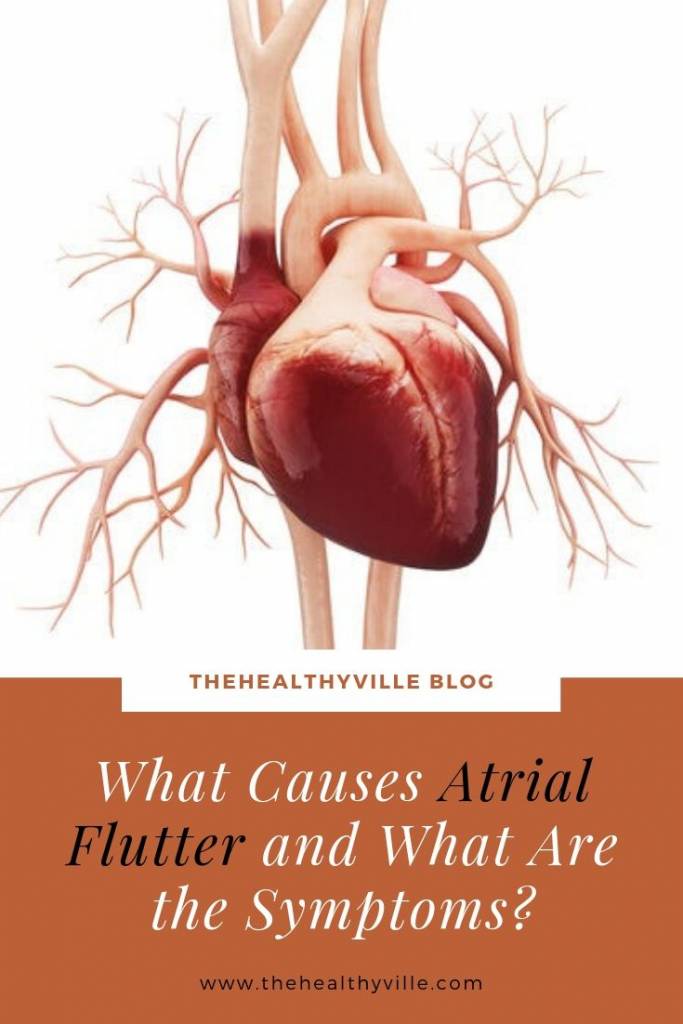What causes atrial flutter? How can we notice it? Is it dangerous? Find out all the information you need and consult your doctor on the next steps.
Atrial flutter can cause weakness, dizziness and palpitations.
Atrial flutter is an arrhythmia, that is, a heart rhythm disorder. It is also called »atrial flutter». It consists of the production of abnormal and very rapid electric shocks in the atrium.
These discharges cause a faster contraction of the atria and, therefore, only some of these electrical impulses reach the ventricles. This causes them to contract irregularly, faster and less efficiently than normal.
Atrial flutter is similar to atrial fibrillation. However, in the flutter rhythm is more organized than in fibrillation. It is a relatively frequent disorder. In fact, its highest incidence is in middle-aged males (60 years old).
In this article we explain what atrial flutter consists of, its symptoms and its causes.
How causes atrial flutter?
Under normal conditions, the heart cavities (atria and ventricles) contract rhythmically and synchronously with an electrical impulse. This impulse is generated in the atrium and passes to the ventricle. In this way the heartbeat is produced.
The normal frequency is between 50 and 100 beats per minute. However, in an arrhythmia, this mechanism is altered. The heart stops contracting in that regular way. If the rhythm is greater than 100 beats per minute, it is called tachyarrhythmia.
In the case of atrial flutter, the activity of the atria remains coordinated. The problem is that they contract at a speed of more than 250 times per minute. Therefore, the impulses cannot reach the ventricles correctly.
In fact, the ventricles reach around one out of every two impulses. This causes a heart rate of about 150 beats per minute. In medical terms, it is said that atrial flutter is a tachyarrhythmia produced by a macro-reentry circuit.
Atrial flutter is a common arrhythmia in patients with a basic cardiac problem. For example, it is more common in people with hypertension, ischemic heart disease or cardiomyopathy. However, it can also occur in people with a healthy heart.
Some of the causes that cause this disorder are:
As we mentioned, previous heart diseases. These include diseases of the heart valves and coronary artery pathologies. In the same way, cardiomyopathies influence, which are alterations of the cardiac muscle.
- Arterial hypertension.
- Consumption of alcohol. It has been especially related to excessive consumption in a short time.
- Other diseases such as pulmonary disorders or hyperthyroidism.
- Having suffered a previous myocardial infarction. It can also occur in people who have experienced coronary artery bypass grafting.
- Some medications.
- Pericarditis.
Symptoms of atrial flutter
The symptoms will depend on the speed at which the ventricles contract. This speed causes the heart’s ability to pump blood to decrease. In fact, the symptoms may start or stop suddenly.
The most typical symptoms are dizziness and respiratory distress. Other symptoms are:
- Weakness.
- Chest pain, especially in those who have other heart problems.
- Pulse accelerated, throbbing and irregular.
- Palpitations.
- Confusion, fainting.
- Loss of capacity for the exercise.
In addition, there can be complications in atrial flutter if blood clots occur in the atria. This can occur because, by beating so fast, the atria do not empty completely and the stagnant blood ends up forming clots.
Fragments of the clot can also be detached and travel through the bloodstream. If these fragments obstruct an artery, they can cause ischemic problems in another area of the body. For example, pulmonary thromboembolisms or strokes.
Diagnosis
The doctor will first listen to the heart and measure the heart rate. The diagnosis is usually based on frequency, symptoms and electrocardiogram.
However, atrial flutter may be intermittent. Therefore, there are other methods that record cardiac rhythms for a longer period of time. Highlights:
- Event monitor (3 to 4 weeks)
- Holter monitor (24-hour test)
- Subcutaneous implantable recorder (extensive monitoring)
In addition, as mentioned, atrial flutter usually occurs in patients with underlying heart disease. Therefore, doctors perform tests such as echocardiography and angiography. In the same way, they also require blood tests, in which the doctor also assesses the activity of the thyroid.
In conclusion
Atrial flutter is a relatively frequent heart rhythm disorder. Therefore, it is necessary to know their symptoms and go to the doctor before any alarm. In this way, you can avoid possible cardiac problems.
Don’t forget to SHARE what causes atrial flutter with your friends and family on your social networks!

